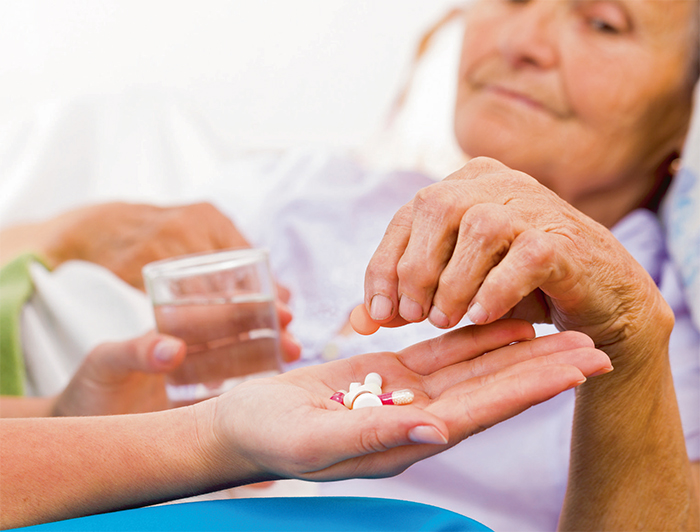Caring for carers
In In-depth
Follow this topic
Bookmark
Record learning outcomes
One in eight adults in the UK is a carer and numbers are set to increase to nine million people by 2037. There is a huge opportunity for pharmacies to help identify carers and offer essential support and signposting

Could you spot a carer in your pharmacy? The chances are, you have a preconceived idea of what a carer is like: perhaps a woman in her 60s caring for an elderly parent, or a younger woman caring for a disabled child. The truth is, carers come in all ages and from every background. Some will be working full-time, others will be at school and many combine caring for a relative with raising a family.
As well as my job as a freelance health journalist, I am also a carer for my teenage daughter, who has a serious mental health condition, while her younger sister is a 'young carer'. We are typical in that we fulfilled our caring roles for three years before a health professional pointed out that in fact we were carers and entitled to a carer's assessment and support.
According to PSNC's Support for carers €“ how community pharmacy teams can help report, it takes an average of two years for a carer to acknowledge their caring role. NHS England's Commitment to carers report found that while 70 per cent of carers come into contact with health professionals, they only identify one in 10, and 66 per cent felt healthcare staff didn't help to signpost them to relevant support and information.
The scale of caring
According to Carers UK, one in eight adults (6.5 million people) in the UK are carers. Every day, 6,000 people take on a caring responsibility and over a million care for more than one person. Over three million carers juggle caring with work, but the demands of caring mean that one in five are forced to give up work. Carers save the economy £119 billion each year and over 1.3 million provide over 50 hours of care per week.
€The UK has an ageing population, and many of those who are living longer are doing so with long-term health conditions that require care. Demand for care is also growing because those who are born with a disability are surviving longer,€ says Emily Holzhausen, director of policy and public affairs at Carers UK.
Caring takes its toll on health, with 625,000 carers suffering mental and physical ill health as a result. According to Carers UK research, half of carers report feeling depressed, eight in 10 are more stressed and eight in 10 feel lonely or isolated.
Many carers are unaware of what financial help is available, including carer's allowance and carer's credit €“ in fact, 95 per cent fail to claim carer's credit.
Who are the carers?
A carer is anyone who provides unpaid care for a family member, partner or friend who can't cope without support because of an illness, disability, frailty, mental health problem or addiction.
The care given can range from practical help with everyday tasks to emotional support for a mental health condition. €It can take years for some carers to realise that they are carers. Even once they have identified themselves as a carer, often they do not know there is support available or where to get it,€ says Emily.
Carers Trust has developed a new toolkit to help professionals spot older carers and offer support. There are 1.8 million carers aged 60 plus and numbers rose by 35 per cent between 2001 and 2011. A report by the Princess Royal Trust for Carers revealed that 65 per cent of older carers have long-term health problems and 68 per cent said being a carer had affected their mental health. Almost half of carers over 75 are looking after someone with dementia.
There are also over 290,000 carers aged 16-24 in the UK and a total of about 700,000 young carers. The Carers Trust has a new website for young carers which allows them to chat, share experiences and access information and advice. The law recently changed and every young carer is now entitled to a visit from a social worker to carry out a needs assessment.
€If pharmacy staff can identify young people with caring responsibilities early, and effective support is put in place, they are far less likely to suffer long-term effects of their caring role,€ says Julia Ellis, development manager (primary care and community reach) at Carers Trust. €Look for clues such as: has the young person brought in a prescription, collected medicines or asked for advice on behalf of someone else? Do they bring someone with them into the pharmacy regularly? Do they come on their own? Do they come at a particular time of day, maybe after school?
Pharmacy staff could say: 'It looks like you're collecting medication for someone else. That's not a problem. Lots of young people your age look after someone. How would you feel about having some help with your caring role? The person you care for may get help too.'€
Emily adds: €Pharmacies should consider displaying posters and leaflets so that carers can self-identify as well as speaking to customers using their services who they believe are carers. When speaking to carers, pharmacy staff should try to gain their consent to refer that carer to a local carer's service and GP.€
 Managing someone's medication is a stressful part of being a carer
Managing someone's medication is a stressful part of being a carer
NHS pledges
€In addition to having a negative impact on the physical and mental health of the carer, looking after someone affects educational, employment, social and financial opportunities,€ says Julia. €If the burden of caring increases without the carer receiving support, the carer may eventually become unable to provide care, resulting in the cared-for person needing hospital or residential care.€
The Department of Health's Carer's Strategy: second national action plan 2014-16 sets out plans to improve the carer's lot. Goals include:
- Funding new projects such as the Carers Trust working with pharmacies to identify carers in pharmacy settings
- Working with Public Health England (PHE) and NHS employers to identify carers through the flu vaccination programme
- Supporting carers and encouraging them to identify themselves at an early stage
- Helping carers to continue with employment and education
- Enabling carers to have a life outside of caring
- Helping carers remain mentally and physically well.
Get involved
Carers were asked which health and social care services in their local community were best at meeting their needs and 67 per cent rated pharmacy as the most carer-friendly service, compared with 57 per cent who said their GP service was carer-friendly and only 36 per cent who rated their hospital as carer-friendly.
The Carer-Friendly Pharmacy initiative, led by Carers Trust and PSNC from November 2014 to February 2015, involved 44 pharmacies from nine LPCs. The aim was to identify 'hidden' carers and refer them to relevant support services in their local area as well as those available within the pharmacy. Carers Trust worked with the CPPE to create a training programme for staff and used the PharmaOutcomes web-based tool to record and analyse data.
As a result of the initiative, 247 carers are now linked to some kind of support and 71 per cent of pharmacy staff surveyed felt the pilot had improved carers' access to services in their area. Some 83 per cent of carers requested a carers information pack from their local carers service, 61 per cent requested a phone call from their carers service and 71 per cent of carers asked for their GP to be notified that they were a carer. This was achieved without any provision of funding to pharmacy teams, LPCs or carers' services.
€Pharmacies are the most visited of all healthcare professions and are therefore ideally positioned to support carers in the community. We hope this pilot will help us build the evidence base for commissioning of carer identification and support services from community pharmacies in the future,€ says Alastair Buxton, PSNC's head of NHS services. €Identifying and supporting carers sooner rather than later and providing them with the help they need to care safely and effectively can prevent the carer from reaching crisis point,€ says Julia.
A carer-friendly pharmacy is one where:
- All staff are trained to be carer-aware and sensitive to carers' needs and able to engage with them
- All staff are proactive in identifying, referring and supporting carers
- A member of the team takes on the role of Carers' Champion along with a deputy. Their role is to lead and facilitate carer referrals and act as a point of contact for external services
- Posters and other materials are used to inform customers that they are carer-friendly
- A range of services, such as MURs, prescription collection and delivery, are offered
- The carer is referred to their local carer's service and GP.
What services can pharmacies offer?
Julia outlines the following as the most useful services that pharmacies can offer to carers:
- Free flu vaccinations, prescription collection, home delivery and repeat dispensing
- MURs for the person cared for while the carer is present
- Disposal of unwanted medicines
- Advice on minor ailments and injuries
- Making the carer's GP aware that the person is a carer so that medical records can be tagged and they may be offered more flexible appointments.
€In our 2015 survey, over 70 per cent of carers said that supporting the person they care for with medication was a stressful part of their caring role. Support with medication from pharmacies, including help with how to administer medication, would be of huge help,€ says Emily. Additional services you could offer include free carer health checks. The CPPE has carer-awareness learning resources on its website and Carers UK has an e-learning course: Carer awareness: supporting frontline practice on its website.
Benefits to pharmacy
€The local pharmacy can soon become an indispensable and approachable resource for carers. Pharmacy staff are often very much aware of the carer's role and can see how it is affecting them,€ says Julia. €For those with a caring role, particularly where the carer is responsible for collecting prescriptions and managing medications, the frequency with which they visit the pharmacy is likely to be considerably higher than the average of 14 times a year.€
Half of carers report feeling depressed and eight in 10 are more stressed, lonely or isolated
